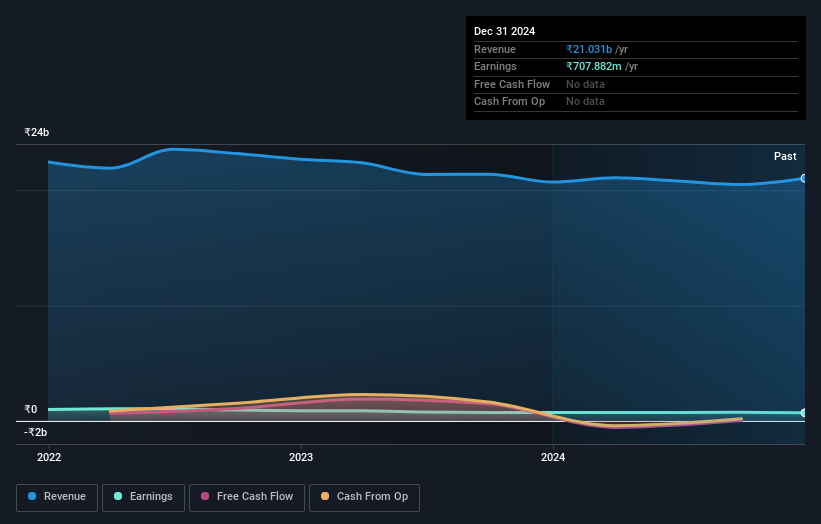Private companies in Renaissance Global Limited (NSE:RGL) are its biggest bettors, and their bets paid off as stock gained 11% last week
Key Insights
- Renaissance Global's significant private companies ownership suggests that the key decisions are influenced by shareholders from the larger public
- The top 5 shareholders own 51% of the company
- Insiders have bought recently
To get a sense of who is truly in control of Renaissance Global Limited (NSE:RGL), it is important to understand the ownership structure of the business. And the group that holds the biggest piece of the pie are private companies with 47% ownership. Put another way, the group faces the maximum upside potential (or downside risk).
Clearly, private companies benefitted the most after the company's market cap rose by ₹1.4b last week.
Let's take a closer look to see what the different types of shareholders can tell us about Renaissance Global.
See our latest analysis for Renaissance Global

What Does The Lack Of Institutional Ownership Tell Us About Renaissance Global?
Institutional investors often avoid companies that are too small, too illiquid or too risky for their tastes. But it's unusual to see larger companies without any institutional investors.
There could be various reasons why no institutions own shares in a company. Typically, small, newly listed companies don't attract much attention from fund managers, because it would not be possible for large fund managers to build a meaningful position in the company. Alternatively, there might be something about the company that has kept institutional investors away. Institutional investors may not find the historic growth of the business impressive, or there might be other factors at play. You can see the past revenue performance of Renaissance Global, for yourself, below.

Hedge funds don't have many shares in Renaissance Global. Our data shows that Anived Family Trust is the largest shareholder with 20% of shares outstanding. In comparison, the second and third largest shareholders hold about 12% and 12% of the stock. Additionally, the company's CEO Darshil Shah directly holds 0.9% of the total shares outstanding.
Our research also brought to light the fact that roughly 51% of the company is controlled by the top 5 shareholders suggesting that these owners wield significant influence on the business.
While studying institutional ownership for a company can add value to your research, it is also a good practice to research analyst recommendations to get a deeper understand of a stock's expected performance. As far as we can tell there isn't analyst coverage of the company, so it is probably flying under the radar.
Insider Ownership Of Renaissance Global
The definition of company insiders can be subjective and does vary between jurisdictions. Our data reflects individual insiders, capturing board members at the very least. Company management run the business, but the CEO will answer to the board, even if he or she is a member of it.
Most consider insider ownership a positive because it can indicate the board is well aligned with other shareholders. However, on some occasions too much power is concentrated within this group.
It seems insiders own a significant proportion of Renaissance Global Limited. Insiders own ₹3.5b worth of shares in the ₹14b company. This may suggest that the founders still own a lot of shares. You can click here to see if they have been buying or selling.
General Public Ownership
The general public-- including retail investors -- own 28% stake in the company, and hence can't easily be ignored. This size of ownership, while considerable, may not be enough to change company policy if the decision is not in sync with other large shareholders.
Private Company Ownership
Our data indicates that Private Companies hold 47%, of the company's shares. It might be worth looking deeper into this. If related parties, such as insiders, have an interest in one of these private companies, that should be disclosed in the annual report. Private companies may also have a strategic interest in the company.
Next Steps:
It's always worth thinking about the different groups who own shares in a company. But to understand Renaissance Global better, we need to consider many other factors. Take risks for example - Renaissance Global has 1 warning sign we think you should be aware of.
Of course this may not be the best stock to buy. Therefore, you may wish to see our free collection of interesting prospects boasting favorable financials.
NB: Figures in this article are calculated using data from the last twelve months, which refer to the 12-month period ending on the last date of the month the financial statement is dated. This may not be consistent with full year annual report figures.
New: AI Stock Screener & Alerts
Our new AI Stock Screener scans the market every day to uncover opportunities.
• Dividend Powerhouses (3%+ Yield)
• Undervalued Small Caps with Insider Buying
• High growth Tech and AI Companies
Or build your own from over 50 metrics.
Have feedback on this article? Concerned about the content? Get in touch with us directly. Alternatively, email editorial-team (at) simplywallst.com.
This article by Simply Wall St is general in nature. We provide commentary based on historical data and analyst forecasts only using an unbiased methodology and our articles are not intended to be financial advice. It does not constitute a recommendation to buy or sell any stock, and does not take account of your objectives, or your financial situation. We aim to bring you long-term focused analysis driven by fundamental data. Note that our analysis may not factor in the latest price-sensitive company announcements or qualitative material. Simply Wall St has no position in any stocks mentioned.
About NSEI:RGL
Renaissance Global
Manufactures, retails, and trades in jewelry, gems, and diamonds in India and internationally.
Adequate balance sheet with questionable track record.
Similar Companies
Market Insights
Community Narratives



